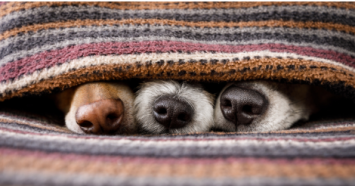
Have you ever wondered why your pup’s nose may sometimes be dry? The moisture and temperature of your dog’s nose can change with the time of day, weather, and underlying medical conditions. A healthy dog with a dry nose is not a reason to rush to the ER vet.
Why Is My Dog’s Nose Dry?
The moisture amount of a dog’s nose can fluctuate throughout the day for a variety of reasons. Lots of dogs will wake up with a temporary dry nose simply because they have not been licking it frequently while asleep. Your household temperature can negatively affect the nose too, such as a warm room with low humidity. Try a humidifier at night to increase air moisture.
Strenuous physical activities or exposure to outdoor elements (extreme wind) may cause a dry nose from dehydration. Dogs with flat faces (brachycephalic) can have a hard time reaching their noses with their tongues. And as dogs age, their noses may appear dryer because of less nasal mucus production. Overall, a dry and/or crusted nose is not always a sign of trouble.
Why Is My Dog’s Nose Wet?
Regularly, most dogs have a cool, wet nose. The wetness of a dog’s nose comes from a mixture of saliva and mucus. The nose constantly secretes a thin layer of mucus, and dogs add even more moisture by licking their noses frequently.
A wet nose also contributes to their incredible sense of smell. When dogs inhale, small scent particles get caught in their nose mucus. By licking the nose, their tongue brings this scent into the mouth to a special scent gland. This gland is the reason why your dog’s sense of smell is stronger than his sense of hearing or sight.
Dogs love to sniff everything! They are always sniffing to investigate something new. The curiosity of sniffing grass, puddles, and leaves will in turn pick up moisture from the environment. If their nose gets dirty, they will lick not only to clean the nose, but to increase their interpretation of the smell. Sniffing irritating allergens in the environment can lead to a runny nose, just like in people!
Why Does the Temperature of My Dog’s Nose Change?
A warm nose does not always indicate a fever. Your dog’s body temperature can only be determined with a thermometer. Excessive sun exposure, especially in dogs with light-colored fur or a thinner haircoat, can cause sunburned skin which may peel or be hot to the touch. Extreme physical activity can increase body temperature, similarly to people exercising.
A wet nose helps dogs regulate their body temperature by evaporating heat. Dogs do not sweat like people. Instead, they have sweat glands in their noses and the pads of their feet to keep them cool.
Why Is My Dog’s Nose Crusty?
Old age, flat faces, and humidity are simple answers to why a dog can have a crusty nose. But what if it’s due to something else? Nasal hyperkeratosis is a medical cause of dry noses in dogs. An excess of keratin production causes the nasal tissues to harden and crack, resembling the “crusty” nose. This condition is due to an abnormal overgrowth of skin cells and picking the “crusts” can cause bleeding that could lead to a skin infection. Flat-faced dogs and toy breeds are more prone to this condition, but it can develop in any breed.
When Should I Be Concerned About My Dog’s Nose?
Your dog’s mucus should always be clear and thin. Monitor your pup for any changes in nasal color, excessive nasal drainage, cracking with or without bleeding, or bumps around the face, muzzle, or nose. Any blood from the nose (epistaxis) is quite concerning. Thickened, discolored, or foul-smelling mucus and nasal discharge, redness, swelling, pain, sores, and/or blisters around the nose are all indicators to contact your local veterinarian immediately.
If your dog has a dry and crusty nose chronically, there could be underlying medical conditions your veterinarian can diagnose. Tear duct obstructions cause improper drainage of the tear ducts to the nose. A thick, mucoid, colored nasal discharge could have a viral, fungal, or bacterial origin. Auto-immune disorders, such as lupus or pemphigus, can cause changes in the surface of the nose that lead to dryness, bleeding, and sores.
For the most part, the occasional dry nose is nothing to worry about. Either a dry and/or warm nose can be temporary. Monitor for chronic or sudden nasal changes and see your veterinarian should problems arise.